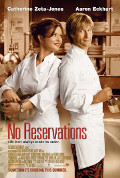
Directed by
Scott Hicks
104 minutes
Rated PG
Reviewed by
Bernard Hemingway

No Reservations
No Reservations is the American remake of Sandra Nettlebeck’s 2001 film, Mostly Martha. As such it follows the original closely although it is somewhat circumscribed by the cruder conventions of the mainstream rom-com, something which takes the film at least on a symbolic level, closer to the erotic role of food. The cultural opposition of Mostly Martha is excised although the broad attitudinal conflict is preserved and there is a greater emphasis on the one-to-one sexual tensions between the lead characters.
Catherine Zeta-Jones now plays the chef, Kate, and Aaron Eckhardt, the disruptive force in her ordered life, Nick. Whereas in the original film Sergio Castellitto was a homely presence, Eckhardt, with his tousled blond locks and manly pick-up truck, is much more of the Hollywood alpha-male type. Most significantly. the film shifts the nature of the central character’s transformation from the awakening of compassionate love due to her bond with her sister’s child to a specifically erotic arousal (this scene is played out with Nick caparisoned in his pick-up truck). Unlike Martha, Kate’s vulnerability is essentially libidinal. Whereas the German original had the shared experience of Martha and Mario traveling to Italy to collect her niece, in No Reservations Kate is unable to resist her sexual attraction to Nick and in a mirror response to the blind tasting scene which is reproduced from the original version, she visits Nick in his apartment and takes him one of her signature dishes in what is a symbolic capitulation to his phallic dominance, something which is rather tweely affirmed in the final scene in which Nick pushes Kate’s wooden spoon back within her newly-confined bench space.
Unlike the communal ending of Mostly Martha with its banquet and extended family, No Reservations resolves with the happy couple now operating their own bistro, with Kate now ensconced in the format of the nuclear family (their marital status is, however, not explained) with the niece as the surrogate child. Although to be fair there is a sense of neighbourhood community portrayed, it is purely circumstantial (and not a little romanticized) and lacks the extended familial and communal dimensions that we have seen in the other films discussed, each of which, needless to say, reflects the socio-culturally determined world-view of its makers.
Want something different?





